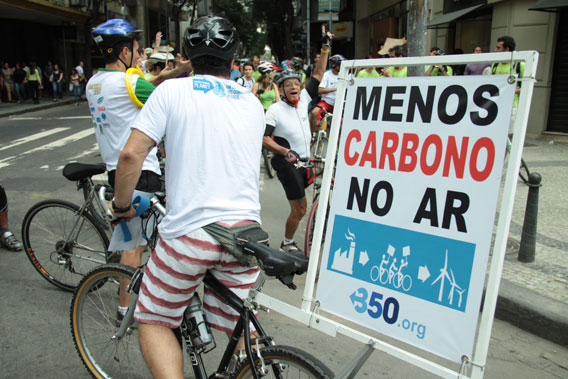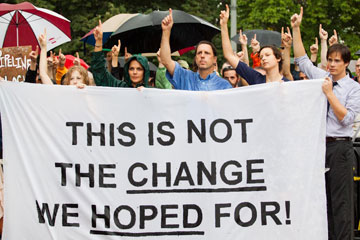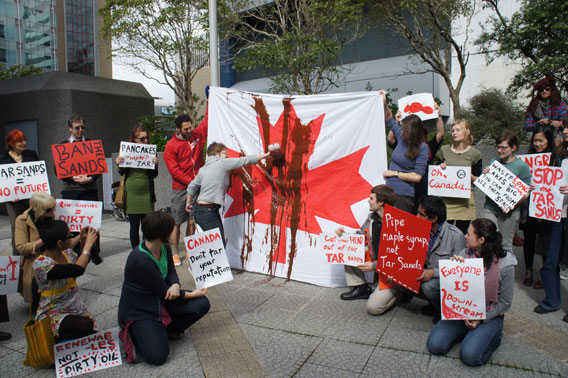On six continents, in over 75 percent of the world's countries, people came out en masse yesterday to attend over 2,000 events to demonstrate the power of renewable energy to combat global climate change. As apart of the 'Moving Planet' campaign organized by 350.org, activists created a giant human-windmill in Paris, gave out bike lessons in Buenos Aires, practiced evacuation measure in the Pacific island of Tuvalu imperiled by rising sea levels, and marched in Cape Town for a strong agreement at the next UN climate meeting hosted in Durban, South Africa. "The planet has been stuck for too long with governments doing nothing about the biggest problem we've ever faced," said Bill McKibben, founder of 350.org. "This is the day when people will get the earth moving, rolling towards the solutions we need."
Many events took on a local flavor. In Sydney activists flew kites calling for the government to put a price on carbon, an issue that the current Australian administration supports but has seen fierce opposition. In the US many activists spoke out against the Keystone XL pipeline that would bring tar sands oil down from Canada to Texas; oil from the tar sands releases significantly more carbon than more conventional sources. In India, ten thousand citizens protested the proposed construction of 80 new coal fired power plants. However, all the events were pushing for societal rejection of fossil fuel power with aggressive pursuit toward renewable and clean energy.
Many people biked, rollerbladed, skate boarded, and took public transit to events. In Santo Domingo, activists painted the Dominican Republic's first bike lane. Scientists have warned for decades that the reliance of global society on fossil fuel energy is putting greenhouse gases into the atmosphere and warming the Earth. 350.org takes its moniker from the scientific-assertion that carbon should be below 350 parts per million in order to retain a stable climate; currently carbon is 390 parts per million.
"Moving Planet, is a global expression of unity, urgency and purpose to show political and business leaders they need to move from rhetoric to action," said Kumi Naidoo, executive director of Greenpeace International, in a press release. "Today, we're beginning to move in the right direction." Naidoo, who was recently arrested off Greenland for boarding an oil rig in the Arctic as apart of an act of civil disobedience, joined hundreds of people protesting a new coal plant in Chicago.
Global climate change is expected to cause, and in many cases has already been linked to, melting of the Arctic, global sea level rise, increased droughts and floods, worsening extreme weather, mass extinction, desertification, amid other impacts such as increased global conflict and famine. Given that governments worldwide have not yet adequately addressed climate change, the 'Moving Planet' day was developed as a chance for citizens to show that fighting climate change is feasible.
"Speak against climate change, talk to your families, community members, your elders and your government," Krishneil Narayan, Pacific media engagement director with 350.org, told the Fiji Times. "You are neither wrong nor alone to ask for a better planet to live in." A thousand trees were planted in Fiji among other events. Across the Pacific Ocean in San Francisco, thousands marched and biked down Market Street. Mother and daughter, Jennifer and Harper Harris, were among the marchers. "Having her made me realize even more how we need to take action now—it makes this more personal," Jennifer Harris told the San Francisco Gate. "And I want her to understand that in a democracy, part of our responsibility is to show up and say what we want from our government." The global day of action opened in the Pacific Island of Tonga at sunrise where a village priest prayed for climate change mitigation, followed by a village choir singing.
Source: Mongabay
Monday 26 September 2011
Cost of the War on Conservation
In the Phong Dien Nature Reserve in central Vietnam, an unlikely resource is hindering formal conservation efforts. Deep in the forest, villagers scavenge for scrap metal left during the Vietnam War. Unprecedented research from the Center for International Forestry Research (CIFOR) and the Institute of Tropical Forest Conservation (ITFC) finds scrap metal gathering is a primary driver in forest degradation and trade in non-timber forest products in Vietnam.
The Khe Tran village lies adjacent to the Phong Dien protected area, where logging and hunting have been prohibited since 1992. The extraction of non-timber forest products (NTFPs) is still permitted, and collectors earn roughly $62 a year scavenging metal, around one-twelfth the mean annual income of surveyed households. In Vietnam, scrap metal is a “backbone product,” meaning it influences markets for other forest products. Traders who purchase metal also will purchase rattan, bamboo, or eaglewood from metal collectors.
Because unexploded ordinance is a threat to metal collectors, collectors minimize risk by torching areas of the forest to increase visibility and detonate mines from a distance. As a result, fire has greatly contributed to the degradation of forests and farmland around Khe Tran village and in the Nature Reserve.
To encourage forest protection, policy makers must understand how local peoples use the forest and what risks their activities pose to long-term conservation. Collecting metal is the primary reason villagers enter the forest, yet they broaden their impact by collecting other forest products—including some threatened species, say CIFOR researchers. As metal becomes scarcer, those dependant on this artificial forest resource could diversify their incomes through timber harvest or the animal trade.
The government has sought to reduce rural reliance on forests by encouraging plantation crop in the place of shifting cultivation. With increased reliable incomes from plantations, and the growing scarcity of metal scavenged from the forest, most villagers in Khe Tran no longer depend on forest metal for their main income. However, members of the nearby Phong Son Commune and other neighboring areas still are reliant on scrap metal as land scarcity has precluded farming alternatives.
The people of Khe Tran have requested formal recognition of their rights to the forest. Perhaps to ensure limited outside access to forest resources, the population of Khe Tran has expressed interest in assisting authorities with conservation goals by monitoring and patrolling the Phong Dien Nature Reserve. As in common in the developing world, government conservation resources are spread thin: only eight rangers patrol the 40,000-hectare protected area.
When war metal becomes too sparse to merit collecting, the poorest and most vulnerable members of Vietnam’s rural communities will be in need of alternative livelihood options, and researchers fear further degrading activates should effective policies to protect the forest while providing income-generating activities is not met.
Source: Mongabay
The Khe Tran village lies adjacent to the Phong Dien protected area, where logging and hunting have been prohibited since 1992. The extraction of non-timber forest products (NTFPs) is still permitted, and collectors earn roughly $62 a year scavenging metal, around one-twelfth the mean annual income of surveyed households. In Vietnam, scrap metal is a “backbone product,” meaning it influences markets for other forest products. Traders who purchase metal also will purchase rattan, bamboo, or eaglewood from metal collectors.
Because unexploded ordinance is a threat to metal collectors, collectors minimize risk by torching areas of the forest to increase visibility and detonate mines from a distance. As a result, fire has greatly contributed to the degradation of forests and farmland around Khe Tran village and in the Nature Reserve.
To encourage forest protection, policy makers must understand how local peoples use the forest and what risks their activities pose to long-term conservation. Collecting metal is the primary reason villagers enter the forest, yet they broaden their impact by collecting other forest products—including some threatened species, say CIFOR researchers. As metal becomes scarcer, those dependant on this artificial forest resource could diversify their incomes through timber harvest or the animal trade.
The government has sought to reduce rural reliance on forests by encouraging plantation crop in the place of shifting cultivation. With increased reliable incomes from plantations, and the growing scarcity of metal scavenged from the forest, most villagers in Khe Tran no longer depend on forest metal for their main income. However, members of the nearby Phong Son Commune and other neighboring areas still are reliant on scrap metal as land scarcity has precluded farming alternatives.
The people of Khe Tran have requested formal recognition of their rights to the forest. Perhaps to ensure limited outside access to forest resources, the population of Khe Tran has expressed interest in assisting authorities with conservation goals by monitoring and patrolling the Phong Dien Nature Reserve. As in common in the developing world, government conservation resources are spread thin: only eight rangers patrol the 40,000-hectare protected area.
When war metal becomes too sparse to merit collecting, the poorest and most vulnerable members of Vietnam’s rural communities will be in need of alternative livelihood options, and researchers fear further degrading activates should effective policies to protect the forest while providing income-generating activities is not met.
Source: Mongabay
Wednesday 7 September 2011
Obama Washes His Hands of the Tar Sands
Two weeks of climate disobedience at the White House ended over the weekend with 1,252 people arrested in total. Activists were protesting the controversial Keystone XL pipeline in an effort to pressure US President Barack Obama to turn down the project. If built the pipeline would bring oil from Alberta's tar sands through six US states down to Texas refineries. While protestors fear pollution from potential spills, especially in the Ogallala Aquifer which supplies water to millions, the major fight behind the pipeline is climate change: Canada's tar sands emit significantly more carbon than conventional sources of oil.
Renowned NASA climatologist, James Hansen, raised awareness of the issue when he wrote that if the tar sands are exploited along with coal reserves "it is essentially game over" for the climate. Hansen was arrested on Day 10 of the protests. What was once a relatively obscure issue impacting 6 states has galvanized environmentalists across all 50 states. After years of disappointment on environmental issues it has become a litmus test of the Obama administration's dedication to fight climate change as he promised to do in his 2008 campaign.
"It’s not the easiest thing on earth for law-abiding folk to come risk arrest. But this pipeline has emerged as the single clear test of the president’s willingness to fight for the environment," author, activist, and head of 350.org Bill McKibben said in a statement prior to being arrested early on in the protests. "So I wore my Obama '08 button, and I carry a great deal of hope in my heart that we will see that old Obama emerge."
However, during the two weeks of civil disobedience, the 'old Obama' was decidedly absent as number of administration decisions further frustrated protesters. An environmental impact assessment of the pipeline found that it would have 'no significant impact' on the environment, but neglected to address what campaigners say is the biggest and most obvious impact: climate change. Then on Friday the Obama Administration backed down on setting regulations on smog standards that scientists say are necessary for public health. After years in the making, the sudden drop of the planned regulations shocked many.
"For two years the Administration dragged its feet by delaying its decision, unnecessarily putting lives at risk. Its final decision not to enact a more protective ozone health standard is jeopardizing the health of millions of American, which is inexcusable," said Charles D. Connor, President and CEO of the American Lung Association.
A litany of recent decisions against environmental protections—including opening up the Arctic to oil drilling—have pushed environmentalists to increasingly view the administration with wariness, instead of as allies. Michael Brune, executive director of the Sierra Club, told the New York Times that if the Keystone XL pipeline is rubber-stamped by Obama it will have large-scale political impact on an administration that is already being seen as weak and cowardly by many of its past supporters. "It will be increasingly difficult to mobilize the environmental base and to mobilize in particular young people to volunteer, to knock on thousands of doors, to put in 16-hour days, to donate money if they don’t think the president is showing the courage to stand up to big polluters," Brune said.
The Keystone XL Pipeline would carry around 800,000 barrels of oil every day 1,700 miles from the tar sands Alberta. Extracting oil from the tar sands is both difficult and energy intensive. The oil—which exists in the form of bitumen and is mixed with clay, water, and sand—must be extracted from the ground with hot water and upgraded by using a high energy process. To make a single barrel of oil two tons of oil-sands and three barrels of water are required. In terms of carbon emissions, Cambridge Energy Research Associates (CERA) estimated the greenhouse gas emissions of the tar sands was 5-15 percent higher than conventional sources, while the International Energy Agency (IEA) found that emissions were 20 percent higher.
Opposition against the pipeline has run against the media-propagated sense of current American politics, which assumes liberals are green-minded while conservatives are happy to sacrifice the environment for wealth. Republican governor of Nebraska, Dave Heineman, came out against the pipeline during the protests.
Opposition against the pipeline has run against the media-propagated sense of current American politics, which assumes liberals are green-minded while conservatives are happy to sacrifice the environment for wealth. Republican governor of Nebraska, Dave Heineman, came out against the pipeline during the protests.
"I want to emphasize that I am not opposed to pipelines," Heineman wrote. "I am opposed to the proposed Keystone XL Pipeline route because it is directly over the Ogallala Aquifer. The aquifer provides water to farmers and ranchers of Nebraska to raise livestock and grow crops." The Ogallala Aquifer spans eight states and provides around one-third of the nation's irrigation water.
Many of the states that would be directly impacted by an oil spill from the pipeline are so-called Red States. Heineman was joined in opposition to the pipeline by Governor of Vermont, Peter Shumlin, a democrat. Vermont has recently seen record flooding from Hurricane Irene, which Shumlin linked directly to climate change. "Our nation must come together to find local, clean, renewable energy to reduce our carbon footprint and spur the economy," Shumlin wrote in a letter opposing Keystone XL, adding, "we need to find sources that will mitigate the impacts of climate change as much as possible for Vermont and the United States."
Many of the states that would be directly impacted by an oil spill from the pipeline are so-called Red States. Heineman was joined in opposition to the pipeline by Governor of Vermont, Peter Shumlin, a democrat. Vermont has recently seen record flooding from Hurricane Irene, which Shumlin linked directly to climate change. "Our nation must come together to find local, clean, renewable energy to reduce our carbon footprint and spur the economy," Shumlin wrote in a letter opposing Keystone XL, adding, "we need to find sources that will mitigate the impacts of climate change as much as possible for Vermont and the United States."
An op-ed from the New York Times also came out against the proposed pipeline, citing a recent report by Canada's environment ministry which estimates production in tar sands will jump to 1.8 billion barrels a day by 2020. "That rate will mean cutting down some 740,000 acres of boreal forest—a natural carbon reservoir.[...] greenhouse gas emissions from the oil and gas sector as a whole will rise by nearly one-third from 2005 to 2020—even as other sectors are reducing emissions," reads the editorial.
The US is the world's biggest consumer of oil: in 2009 it is estimated that the US consumed 18,690,000 barrels of oil a day or 6.8 billion a year. It is also the world's largest importer. Although US politicians have long paid lip service to the nation's addiction to oil and its impact on both the environment and foreign policy, almost nothing has been done to stem the addiction. In fact, for decades the US has focused on importing more from abroad and drilling more—including off-shore drilling—rather than curbing consumption. The one thing the Obama Administration has done on this front is raise efficiency standards for vehicles, though that has not appeased activists who see a need for the federal government to propel the US to move beyond the age of fossil fuels.
Those arrested in the protests included McKibben, Hansen, actresses Daryl Hannah and Margot Kidder, filmmaker Josh Fox, author Naomi Klein, former White House official Gus Speth, and aboriginal activist Gitz Derange. A petition against the pipeline has been signed by over 600,000 people. "If the tar sands pipeline is approved, we will be back and we will grow," Hansen said. "For the sake of our children and our grandchildren, we must find somebody who is working for our dream."
Source: Mongabay
Subscribe to:
Posts (Atom)










